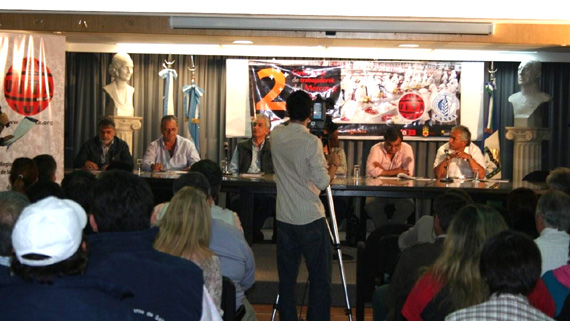|
Workers
from Mercosur's Meat Industry held their second conference last Oct. 25-26, as
the sector undergoes great changes, foresees even greater ones and becomes more
complex in many ways. A more efficient involvement by unions and small producers,
plus the urgent need to implement public policies aimed at protecting jobs and
promoting food sovereignty were some of the actions defined as vital by the
delegates from the sub-region.
The growing
presence of transnational corporations in the meat sector; the concentration of
Argentina's and Uruguay's meatpacking plants in Brazilian
hands; the sector's monopolization by a handful of Brazilian companies;
the injection of public funds for the capitalization of Brazil-based
transnational corporations; the situation created by the cattle shortage in
Argentina and Uruguay; the expansion of soy crops to the detriment of
natural pasture lands for cattle raising; the increase in cholesterol content
caused by the feedlot system (cows grown in confined lots, like chickens, as
opposed to pasture raised cattle) and the ensuing loss in our products' quality;
consumers and workers having to pay the price for a business boom enjoyed by
only a few; and the environmental impacts and increasing problems in
health and working conditions are some of the issues that merited the
organization of this Second Conference of Mercosur Meat Industry Workers.
With the
incorporation of Argentina's Trade Union Federation of Meat Industry
Workers to the IUF,
our international federation now represents the vast majority of the sector's
labor organizations in Argentina
and Brazil.
To that we must add the expansion in membership that the
IUF is achieving in
Uruguay.
This context was what motivated us to call for the forming of a
Coordinating
body of MERCOSUR MEAT industry workers,
to have a platform from which to leverage the work of our international
federation, with the aim of improving information channels, carrying out
solidarity actions by combining forces, in order to give visibility to this
whole situation, and addressing the challenges faced by this sector's workers.
We worked intensely over the two days of the conference, gathering additional
inputs and new insights to achieve an accurate and current assessment of the
activities of transnational corporations in the sector,
a who's who of
the industry and a mapping of how things are played out regionally and globally.
The event was an opportunity to get to know our organizations' strengths and
identify their weaknesses, and above all to devise strategies that will enable
us to
move forward in our efforts to provide decent working conditions for MEAT
industry WORKERS.
 |